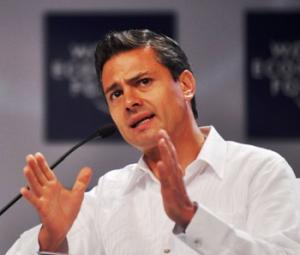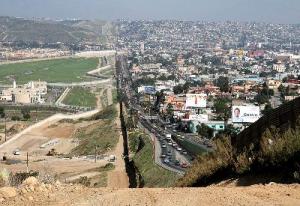Consequences of Prohibition
Drug War Issues
Politics & Advocacy
Dismayed and horrified by the wave of prohibition-related violence unleashed on Mexico with President Calderon's deployment of the military to fight the country's wealthy and powerful drug trafficking organizations -- the so-called cartels -- Mexican voters on Sunday appear to have rejected Calderon's party, the PAN, instead harkening back to the past, choosing as president-elect Enrique Peña Nieto, candidate of the PRI, the party that dominated Mexico for most of the 20th Century.

Mexico's likely next president, Enrique Peña Nieto (wikimedia.org)
The election came amidst relentless and terrifying violence. At least 55,000 people have been killed in the internecine conflicts among the rival cartels and in the multisided fighting between the cartels, the police, and the military, with thousands more gone missing. Election week saw a new video of Gulf Cartel operatives beheading four Zetas, as well as the killing of three federal police officers at the Mexico City airport by other federal police officers being targeted in a drug trafficking investigation.
That is nothing unusual for Mexico these days, six years after Calderon sent 50,000 troops and federal police out to stop the cartels. The question is whether Peña Nieto is going to do anything substantially different once he takes power in December, and right now, the answer is unclear.
During the run-up to Sunday's election, the charismatic former governor of the state of Mexico attempted to create some distance between himself and Calderon's approach, but his policy prescriptions appear to be more in the nature of adjustments than a radical rethinking. He has made two direct proposals for retooling Mexico's drug war and one key appointment.
Peña Nieto has called for the creation of a paramilitary force of 40,000 ex-soldiers to take the burden of fighting the heavily-armed cartels from the military, which has seen an increasing number of human rights complaints filed against it. But that will take time to pull together, and he has said nothing about sending the military back to its barracks before then.
He is also calling for something like a single unified national police force, or what he calls the mando unico, the unified command. Calls for reforming Mexico's police, with its thousands of different municipal, state, and federal department, have been a constant for at least the last quarter-century, as those forces repeatedly expose themselves as hopelessly corrupt and inefficient. But reorganizations have been done before, only to create a new cadre of cops to be corrupted.

The US-Mexican border
On Tuesday, Peña Nieto told PBS he would continue to use the military indefinitely.[Editor's Note: In that same interview, he had some words to say about discussing drug legalization; see our news brief on that here.]
"I will maintain the presence of a Mexican Army, and the Navy and police in the states of the Mexican Republic, where the problem of crime has increased," he said. "We will adjust the strategy so that we can focus on certain type of crimes, like kidnapping, homicide, extortion, which today, unfortunately, have worsened or increased, because we have a lot of impunity in some areas. The state's task is to achieve more efficiency, and to go back to the rule of law and enforce laws strictly in our country."
Raising eyebrows in Washington, Peña Nieto has previously hinted that he may refocus Mexico's anti-crime efforts, placing lesser emphasis on nailing cartel kingpins and eradicating illicit crops and placing more emphasis on reducing the violence.
"Violence is the most sensitive issue for Mexicans," he told the Financial Times in his first interview with an international newspaper. "Mexico cannot put up with this scenario of death and kidnapping."
Such comments have led many observers in both Mexico and the US to suggest that Peña Nieto may revert to the PRI's old ways. It is commonly believed -- although difficult to prove -- that during the latter part of its 70-year rule, that the PRI did not so much attempt to suppress the drug trade but to manage it, allowing itself to be bought off by the cartels. In return for non-interference from the state, the drug traffickers would keep a relatively low profile as they went about their business. What is certain is that the levels of violence around the drug trade and its repression have soared during the 12 years the PAN held power and moved aggressively against the cartels.
[Ed: Whether or not the government or individual officials made explicit deals with the cartels, it is generally understood among scholars that government's mostly manage illegal drug trades rather than seriously trying to undo them -- doing so enables them to keep crime within "normal" levels, as opposed to the kinds of bloodbaths seen in Mexico recently or Colombia during the time of Pablo Escobar.]
Sensitive to such charges, Peña Nieto took pains to say he was not going to make deals with the cartels. "There will be no pact or truce with organized crime," he said.
"What's really going on is that he's being very careful to assure the US that it will be business as usual, that they will continue fighting the drug war," said Nathan Jones, a fellow in drug policy at the Baker Institute in Houston. "There could be ways you could shift from counter-narcotics to counter-violence and have it be in line with US policies. With a counter-violence strategy, you would be consciously and publicly targeting the most violent cartels, but they're already doing that."

What drug prohibition brings Mexico (PGR Mexico)
Still, Dunn said, the PRI has traditionally had a close relationship with the US, and Peña Nieto will seek to keep it that way.
"I would anticipate that in public relations with the US, he will say they'll go after the capos, but that's very much up in the air," she said. "He has also suggested that putting the military back in its barracks is an option, but I consider that very unlikely given the pressures the US would exert."
It is also unlikely, at least in the near term, because there is no effective force in place to replace the military.
"This idea of the paramilitary force composed of former soldiers seems to be popular in Mexico because the military is the second most respected institution in the country behind the Catholic Church," said Jones, "but 40,000 men is a very large force and that will take time to build, so they continue to have to use the military at least for the short term."
"The one reform Mexico really needs is a complete overhaul of its police force," said Dunn. "Peña Nieto has suggested the shift, and his paramilitary plan could be the core of a national police force. We need a complete overhaul of the more than 2,000 different police forces that have been rife with corruption and lack of transparency, but what that overhaul will look like is up in the air."
Reforming law enforcement, though, is an old and so far failed game in Mexico. As each corrupted unit or department is disbanded and replaced, the new ones consistently fall prey to the same temptations.
"One problem is that Mexico has been readjusting its federal police forces since the 1980s, they've had an alphabet soup of federal drug enforcement agencies, so I'm a bit skeptical about a new one," she added.
One obstacle to reforming the Mexican police will be political. While Peña Nieto triumphed on Sunday, the PRI failed to achieve a majority in the congress. That means he will need the support of other parties to move forward on the idea, and that's by no means a given.
Peña Nieto has five months before he takes office in December. There is no sign of any let-up in the prohibition-related violence, nor any sign all the captures or killings of cartel higher-ups are having any impact on the violence or the drug trade. And there appears to be little sign that the new president will do anything radically different about it -- at least not out in the open.
This work by StoptheDrugWar.org is licensed under Creative Commons Attribution-ShareAlike 4.0 International
Comments
the most revealing info. in
the most revealing info. in the whole article to me was the bit about the mexican president appointing that right wing columbian 'intelligence' officer who worked closely with american officials and basically diverted much of the illegal trade from political enemies to allies. powerful right wingers are zealots, hypocrites and liars. so look for the drug war in mexico to continue but with greater corruption and official involvement in or at least knowledge and tolerance of illicit drug traders who support the government.
as for police reformation, what that means is installing one's own political cronies in positions of power. nothing more, nothing less. the faces, names, and official titles may change, but the game goes on as before.
Add new comment